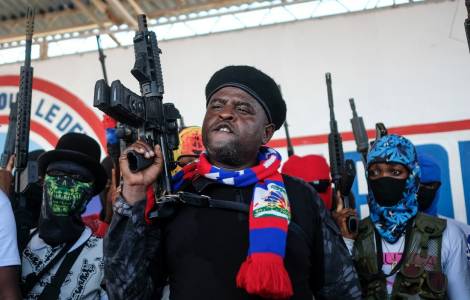
Port-au-Prince (Agenzia Fides) - "The resignation of the Prime Minister has made it clear that the plan of the armed groups to take power in Haiti has worked," said Sister Marcella Catozza of the Franciscan Sisters of Busto Arsizio, who has been in office since 20 He worked in Haiti for years in the “Kay Pè Giuss” orphanage in the Warf Jeremie shanty town, to Fides. Prime Minister Ariel Henry was forced to resign after Haitian criminal gangs prevented him from returning home. His resignation was one of the demands of the more than 300 armed gangs led by Jimmy Chérizier, known as "Barbecue" (see Fides, 5/3/2024).
"The whole world called on the Prime Minister to resign and unfortunately the violence worked," emphasizes Sister Marcella in an interview with Fides.
What is the situation in Haiti currently?
The reality in the country has not changed since the last few days: violence is still there, as shown by the murder of six police officers, schools, hospitals and universities are under attack, terror continues on the streets, people are afraid, there are no basic services, no water, everything is missing. At the moment we are in a stalemate. The prime minister has resigned and there is now a proposal to set up a seven-person interim presidential council, which the gangs have so far refused to recognize. So Haiti is in a kind of limbo.
Is there a fear that the Haitian "model" could be imitated in other countries in the region? The fear is certainly justified, precisely because the Haitian gangs got what they wanted. And now everyone can try to get what they want in the same way. There is a real risk that other Caribbean countries will experience extreme violence similar to that which occurred in Haiti last year. The Americans have closed the waters off Florida because they fear a mass exodus with a massive influx of refugees, among whom criminal gangs could perhaps mix.
The Country that most fears consequences for the chaos in Haiti is the Dominican Republic… Yes, and that is why the Dominican President declared Haitian Prime Minister Henry “persona non grata” by denying him permission to land his plane in the Dominican Republic. But even this stance was helpful to the Haitian gangs, who used extreme violence to force Ariel Henry's resignation.
It is unclear whether there is a political concept behind all of this.
At the moment it is difficult to understand who could be behind the gangs' actions. From my experience of 20 years in Haiti, I can say that I believe there is a plan, not least because of the silence of Jimmy "Barbecue" Chérizier (who has spoken practically 10 hours a day for the last 10 days) after the resignation of Ariel Henry: It almost seems as if he is waiting for orders from someone to take the next step. Maybe that someone is waiting for the seven-name shortlist for the President's Transitional Council to be released. I definitely believe that someone is behind the gangs, also because the weapons I've seen them use are very modern. These criminals have drones, it's not that they only have machetes, they have that too, but they mainly have rifles and machine guns. One of these gangs is stationed right next to our house and we see boxes of new weapons arrive; we hear them testing the weapons. Boxes of weapons arrive periodically, which they then test, so we have learned to distinguish whether they are shots from a firefight or whether they are newly arrived weapons. This doesn't happen daily, but certainly weekly. In addition to the weapons, so-called "new soldiers" continue to arrive, boys who are recruited from the streets because they are hungry. In some cases, I have seen criminals in our area go "door to door": they go into houses and take the boys away from their families. That's why in June and July we tried to relocate the male youths who were housed in our facility because they were at risk of being forcibly recruited by the gangs. The latter are the only establishments in Haiti that can offer food. The generation that grew up in the last 20 years experienced the "economic boom" after the earthquake (2009) with the mass arrival of NGOs that brought money and humanitarian aid and offered relative prosperity (mobile phones, motorcycles), but built however on Nothing. So now young people are easy prey for criminal gangs, offering them a plate of rice and a weapon that "gives them power." In this way they recruit dozens of young people. Even the gang that runs our area forces all boys ages 16 and older to do two years of "military service" in their ranks. (L.M.) (Agenzia Fides, 15/3/2024)